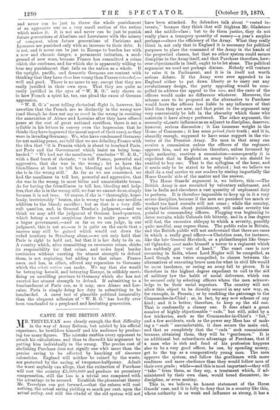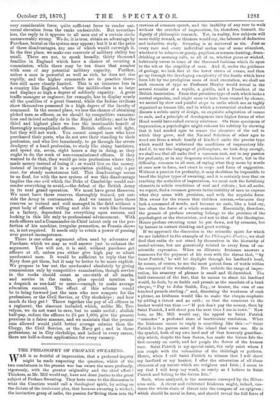CASTE IN THE BRITISH ARMY.
. TREVELYAN sees clearly enough the first difficulty ltrl in the way of Army Reform, but misled by his official experience, he bewilders himself and his audience by produc- ing too many figures. The mistake enables every opponent to attack his calculations, and thus to discredit his argument by putting him individually in the wrong. The precise cost of abolishing Purchase does not signify one whit more than the precise saving to be effected by knocking off sinecure colonelcies. England will neither be ruined by the waste, nor protected by the saving, of twopence-halfpenny. Admit the worst anybody can allege, that the extinction of Purchase will cost the country £5,000,000 and produce no pecuniary compensation, still the loss is a trivial one compared with the advantage to be secured. Establish the pleasantest theory Mr. Trevelyan can put forward,—that the reform will cost nothing, the actual saving yielding so much per cent. upon the actual outlay, and still the citadel of the old system will not
have been attacked. Its defenders talk about " vested in- terests," because they think that will frighten Mr. Gladstone and the middle-class ; but to do them justice, they do not really place a trumpery quantity of money—a year's surplus perhaps—above the efficiency of the Army. What they really think is, not only that in England it is necessary for political purposes to place the command of the Army in the hands of the propertied classes, but that no other system could secure discipline in the Army itself, and that Purchase therefore, how- ever objectionable in itself, ought to be let alone. The political argument we need not perhaps discuss. Nobody will venture to raise it in Parliament, and it is in itself not worth serious debate. If the Army were ever appealed to in England either to put down liberty or to carry out any revolutionary design, the party appealing would be com- pelled to address the appeal to the men, and the caste of the officers would make no difference whatever. Moreover, the scheme sure to be proposed as the alternative to Purchase would leave the officers less liable to any influence of that kind than they are now, and that point in the argument may very conveniently be left in the obscurity which those who maintain it have always preferred. The other argument, the necessity of.caste influence as an adjunct to discipline, deserves, however, serious discussion ; it has immense weight in the House of Commons ; it has some prima facie truth ; and it is, absurdly enough, supposed to have some support in the vic- tories of the Prussian Army. No man in that army can receive a commission unless the officers of the regiment approve him, and no plebeian therefore, unless favoured by high authority, receives a commission—consequently it is expedient that in England an army tailor's son should be enabled to buy one. That is the syllogism of the hour, and it needs only to be stated to be refuted ; but we believe we shall do a real service to our readers by stating impartially the Horse Guards' side of the matter and the answer.
The Horse Guards' argument is, we believe, this :—The British Army is one recruited by voluntary enlistment, and has in India and elsewhere a vast quantity of unpleasant duty to perform. It is therefore impossible to keep up in it a very severe discipline, because if the men are punished too much or worked too hard recruits will not come ; while the country, always fastidious about punishment, will make severity too painful to commanding officers. Flogging was beginning to deter recruits, while Colonels felt bitterly, and in a less degree still feel, the excessive obloquy to which a severity, possibly quite needful, may expose them. The public rules in Britain, and the British public will not understand that there are cases in which a really good officer—a Christian man, for instance, like the late General Havelock, or a philanthropist like Gene- ral Oglander, must make himself a terror to a regiment which has suddenly got "out of hand." The exact case is now occurring in India, where Lord Napier will be compelled, as Lord Gough was twice compelled, to choose between the alternatives of executing brave men for what in civil life would be mere insolence, or seeing an army fall to pieces. It is therefore in the highest degree expedient to call to the aid of military law the habit of social deference, which can be secured only by selecting officers whom the men acknow- ledge to be their social superiors. The country will not allow this object to be directly secured in any new way, as, for example, in Prussia ; or by confiding the patronage to the Commander-in-Chief ; or, in fact, by any new scheme of any kind ; and it is better, therefore, to keep up the old one. That is confessedly a clumsy one. It does admit a great number of highly objectionable " cads," but still, aided by a few trickeries, such as the Commander-in-Chief's "list," and a few accidents, such as the power any Mess has of mak- ing a " snob " uncomfortable, it does secure the main end, and that so completely that the " cads " seek commissions because, obtaining them, they will be "gentlemen." It is an additional but subordinate advantage of Purchase, that if a man who is rich and fond of his profession happens also to be a very good officer, he can, by spending money, get to the top as a comparatively young man. The men approve the system, and follow the gentlemen with more readiness and more obedience than they would follow men of their own grade ; while—and this is most important—they will "take " from them, as they say, a treatment which, if ad- ministered by their own class, would breed discontent, in- discipline, or even mutiny.
This is, we believe, an honest statement of the Horse Guards' case, and it is folly to deny that in a country like this, where authority is so weak and influence so strong, it has a very considerable force, quite sufficient force to render uni- versal elevation from the ranks undesirable. But neverthe- less, the reply to it appears to all men out of a certain circle unanswerably strong. We do, it is true, obtain an advantage by Purchase, brutal as the system may appear; but it is at the price of three disadvantages, any one of which would outweigh it. In the first place, we make our reservoir of military ability too small. There are not, to speak broadly, thirty thousand families in England which have a chance of securing a commission, while there may be ten times that number with sons of any potential military capacity. Further, unless a man is powerful as well as rich, he does not rise rapidly, and the higher commands are in practice there- fore still more closely limited. This is an immense loss in a country like England, where the middle-class is so large and displays so high a degree of soldierly capacity. A great traffic manager or engineer, for example, has to display nearly all the qualities of a great General, while the Indian civilians show themselves possessed in a high degree of the faculty of command. In the second place, we lose the chance of obtaining picked men as officers, as we should by competitive examina- tion and indeed actually do in the Royal Artillery; and in the third and highest place we lose the inestimable benefit of thoroughly accomplished officers. British officers will fight, but they will not work. You cannot compel men who have purchased their posts, who do not owe their standing to their profession, and who live luxuriously, to go through the severe drudgery of a hard profession, to study like rising barristers, and spend six, seven, eight hours a day in doing, as they ought to do, the work of non-commissioned officers. If they wanted to do that, they would go into professions where they made money instead of losing it ; or would live on the money, instead of investing it in a speculation yielding only 5 per cent. for steady monotonous toil. This disadvantage seems to us final, for with the new system of war this disadvantage implies the one evil which the Duke of Cambridge would sur- render everything to avoid,—the defeat of the British Army in its next grand operation. We must have great Reserves. We must have those reserves thoroughly trained, yet out- side the Army in cantonments. And we cannot have those reserves so trained and well managed in the field without a great body of officers willing and able to work like foremen in a factory, dependent for everything upon success, and looking in this life only to professional advancement. With such officers and a Commander-in-Chief intent only on the per- fection of his machine, irregular promotion, as Prussia shows us, is not required. It needs only to retain a power of passing over proved incompetence.
There is one other argument often used by advocates of Purchase, which we may as well answer just to exhaust the argument. You will not, it is said, without purchase get officers at all, unless you either give high pay or admit uneducated men. It would be sufficient to reply that the Navy does get them, but it may be better to be more explicit. We propose to bar out the uneducated absolutely by giving commissions only by competitive examination, though service in the ranks should count as one-sixth of all marks, and service in the ranks, plus special mention in a despatch as one-half or more—enough to make average education succeed. The effect of this scheme would be to bring forward just the men who now compete for the professions, or the Civil Service, or City clerkships ; and how much do they get Throw together the pay of all officers in a regiment, the sinecure included, which, unlike Mr. Tre- velyan, we do not want to save, but to make useful ; abolish half-pay, reduce the officers to 25 per 1,000, give the present pensions in a fairer manner, and we maintain that the present sum allowed would yield better average salaries than the Clergy, the Civil Service, or the Navy get ; and in those professions, as in City clerkships, and indeed in every career, there are half-a-dozen applications for every vacancy.



































 Previous page
Previous page